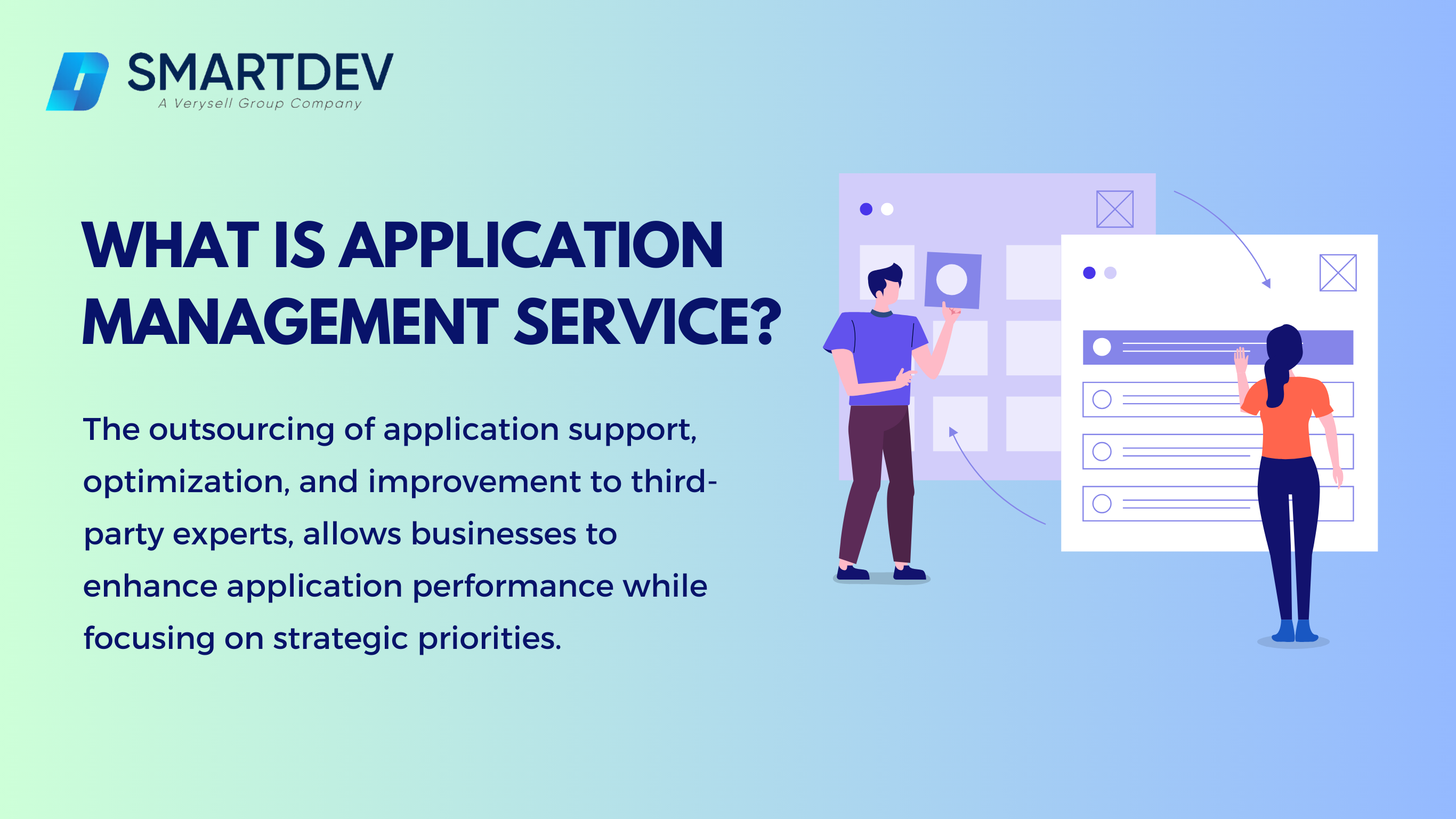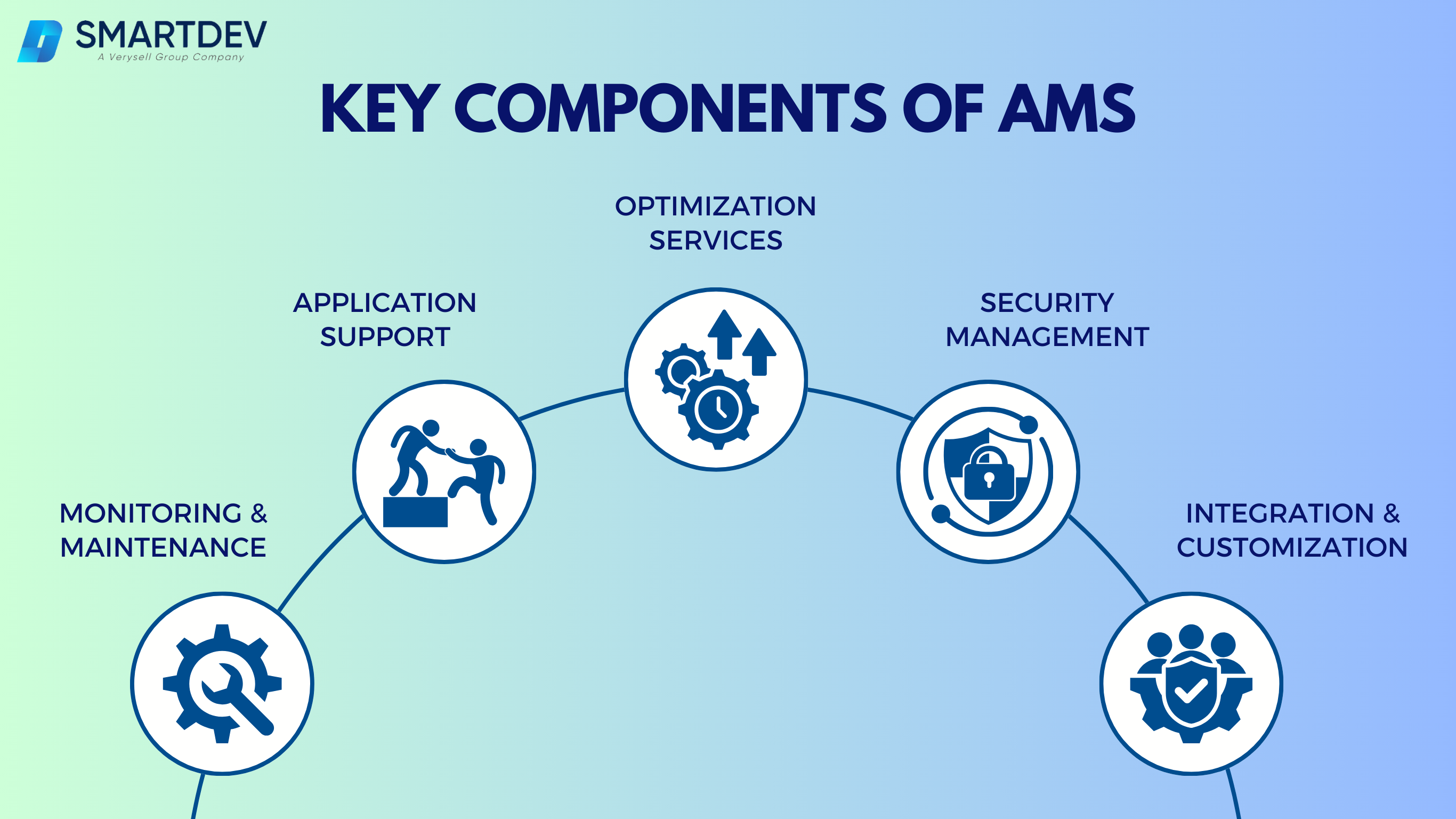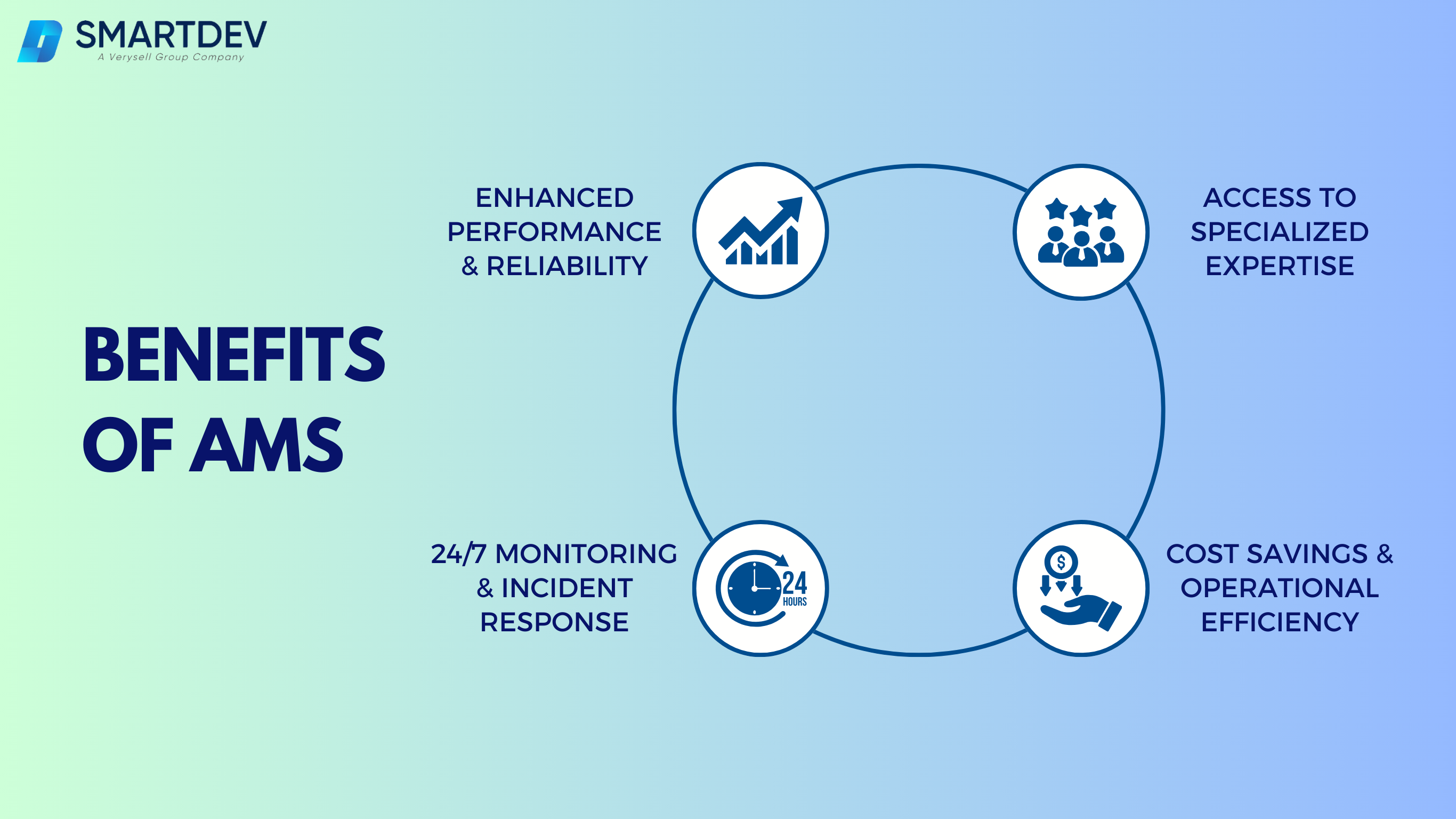In today’s increasingly digitized environment, Application Management Services (AMS) have become critical for businesses aiming to streamline their IT operations, minimize downtime, and optimize their technology investments.
With a focus on maintaining and enhancing the performance of business applications, AMS provides comprehensive solutions that support everything from routine maintenance to advanced security and scalability.
Key Takeaways
- Beyond Traditional IT: Modern AMS offers proactive, strategic support that aligns applications with business goals.
- Core Components for Efficiency: Key AMS services like monitoring, optimization, and security management drive application performance and scalability.
- Adaptable Solutions Across Sectors: AMS is flexible, with on-premises, cloud, and hybrid options that serve various industries, from healthcare to retail.
- SmartDev in Action: Case studies, such as high-availability support for a PR platform, show SmartDev’s AMS solutions delivering real impact.
- Choose Wisely: Selecting an AMS provider with relevant experience and robust SLAs is crucial for aligning AMS with your needs.
- Future-Ready AMS: Trends like AI, multi-cloud, and enhanced security are shaping AMS, allowing providers like SmartDev to deliver even stronger solutions.
Application Management Services (AMS): Expert Guide for IT Success
AMS is far more than a routine IT solution; it provides organizations with a framework to proactively manage their application ecosystems, reducing costs, improving efficiencies, and aligning applications with business goals. In the past, businesses primarily relied on in-house teams for IT support, often leading to resource strains, skill gaps, and inconsistent application performance.
The rise of AMS has shifted this paradigm, allowing companies to focus more on core business functions while delegating complex application management to specialized experts.
The Evolution of AMS
Historically, AMS was limited to support functions such as troubleshooting, minor fixes, and handling user issues. Over time, this has evolved into a holistic managed services model encompassing optimization, customization, security, and strategic alignment with business objectives.
Today’s AMS providers go beyond solving immediate problems; they focus on preventing issues, automating workflows, and delivering insights that enable business growth and innovation.
1. What is Application Management Service (AMS)?

At its core, AMS refers to a collection of services focused on managing and maintaining business applications throughout their lifecycle. Unlike traditional IT support, which is often reactive, AMS adopts a proactive and preventive approach, focusing on stability, scalability, and security to optimize the user experience.
1.1. Definition and Explanation
Application Management Services cover a range of functions, including continuous monitoring, troubleshooting, performance tuning, and implementing upgrades. AMS is designed to handle the evolving needs of applications as businesses grow and technology landscapes change.
1.2. Key Differences Between AMS and Regular IT Support
Proactive Management: AMS providers actively monitor application performance and prevent potential issues through early intervention, whereas regular IT support is often reactive.
Specialized Services: While IT support handles general issues, AMS encompasses specialized services such as scalability assessments, advanced security protocols, and integration with other business applications.
Long-term Strategy Alignment: AMS is tailored to support business goals, whereas traditional IT support focuses primarily on maintaining operational continuity.
1.3. Common Myths about AMS
Organizations sometimes hesitate to adopt AMS due to misconceptions:
- AMS is too costly: When compared to the cost of disruptions, downtime, and frequent manual interventions, AMS often results in significant long-term savings.
- AMS replaces in-house IT teams: Rather than replacing internal IT, AMS complements it by handling specialized tasks, freeing internal teams to focus on strategic projects.
- AMS is only for large enterprises: Small to medium-sized businesses can leverage AMS to access expert support without the expense of building an in-house team.
2. Key Components of Application Management Services

AMS covers a broad spectrum of services, each critical to maintaining a secure, high-performing, and resilient application environment.
Monitoring & Maintenance
This foundational element involves real-time monitoring to detect and address issues before they impact end-users. Maintenance includes regular updates, performance checks, and capacity planning.
Application Support
AMS providers offer immediate support to resolve application issues, including bug fixes, user support, and troubleshooting.
Optimization Services
As part of AMS, providers engage in performance tuning, load balancing, and scalability adjustments to ensure applications operate efficiently as the business grows.
Security Management
Security is a core concern in AMS, covering patch management, compliance tracking, and data protection. With evolving cyber threats, AMS providers implement robust security protocols to safeguard data integrity.
Integration and Customization
Modern AMS allows businesses to tailor application services to their unique operational needs, ensuring compatibility with other software systems and workflows.
3. Types of Application Management Services
Understanding the types of AMS available helps businesses make informed choices based on their infrastructure, operational requirements, and budget.
3.1. On-premises vs. Cloud-based AMS
- On-premises AMS: Managed within the company’s own servers and data centers, on-premises AMS is suitable for organizations with strict compliance needs or security policies. It offers full control but often requires significant investment in infrastructure and IT staffing.
- Cloud-based AMS: Hosted on a provider’s cloud infrastructure, cloud-based AMS offers greater flexibility, reduced overhead costs, and easier scalability. This is especially beneficial for businesses with remote teams or those planning rapid expansion.
3.2. Outsourced vs. In-house AMS
- Outsourced AMS: By engaging third-party providers, companies gain access to specialized expertise and cost efficiencies. Outsourcing can be particularly advantageous for businesses without the resources for in-house teams.
- In-house AMS: Managed by internal staff, in-house AMS allows for more control but requires a significant investment in hiring and training specialized IT professionals.
4. AMS Use Cases and Examples

Application Management Services (AMS) serve a wide array of industries, each with unique requirements and challenges. By adapting AMS solutions to specific sector needs, organizations can overcome application bottlenecks, enhance scalability, and maintain continuity even during rapid growth.
4.1. Use Cases Across Industries
AMS solutions can be tailored to fit various industries, addressing sector-specific demands:
- Retail and eCommerce: AMS is crucial for retailers and eCommerce businesses that experience seasonal spikes or unexpected surges in traffic. By partnering with an AMS provider, retail businesses can scale seamlessly without disrupting customer experience, keeping performance smooth and preventing revenue loss during high-demand periods.
- Healthcare: Healthcare applications require continuous uptime and strict data compliance due to the sensitive nature of patient data and the industry’s regulatory standards. AMS providers help healthcare institutions maintain secure, compliant applications, ensuring that electronic health record (EHR) systems, patient portals, and other tools function smoothly and securely.
- Financial Services: The financial sector often handles high transaction volumes and must adhere to strict compliance regulations. With AMS, financial institutions gain reliable support for real-time transaction monitoring, security management, and regulatory updates to keep applications secure and compliant.
4.2. SmartDev Case Study: Ensuring High Availability for a Public Relations Platform
SmartDev successfully enhanced the high availability of a public relations platform by implementing a robust AMS solution tailored to support the platform’s unique needs.
This case involved building a resilient infrastructure capable of supporting real-time media monitoring, high traffic volumes, and intensive data processing. Through this AMS partnership, SmartDev provided continuous monitoring and rapid response solutions that helped prevent downtime, ensuring that users could rely on the platform during critical events.
By leveraging real-world examples like these, SmartDev illustrates how tailored AMS solutions can enhance performance, increase reliability, and allow companies to focus on strategic growth rather than day-to-day application management.
5. Benefits of Application Management Services

AMS delivers a range of benefits that extend beyond basic IT maintenance, aligning directly with the broader goals of operational efficiency, security, and growth.
Access to Specialized Expertise
AMS providers like SmartDev bring industry-specific knowledge, advanced skills, and technologies to manage complex applications. For instance, SmartDev’s expertise in the PR sector helped secure the platform’s scalability, allowing for robust real-time data processing.
Cost Savings and Operational Efficiency
AMS allows organizations to avoid the high costs of maintaining in-house teams with specialized skills. Instead, by outsourcing application management, companies can reduce operational expenses while benefiting from continuous, high-quality support. SmartDev’s solutions for one of its retail clients exemplify how AMS helped manage high-traffic demands during seasonal peaks without the retailer needing to expand its internal IT resources.
Enhanced Performance and Reliability
Through AMS, companies gain the advantage of proactive performance tuning, which keeps applications running smoothly. For example, SmartDev’s collaboration with the PR platform involved active load balancing, which ensured stable application performance during high-traffic periods.
24/7 Monitoring and Incident Response
AMS providers offer round-the-clock monitoring and quick issue resolution, allowing businesses to focus on core functions without worrying about application downtime. In SmartDev’s experience, providing 24/7 support for the PR platform enabled instant responses to incidents, drastically reducing downtime.
6. Challenges of Application Management Services

While AMS provides valuable support, adopting AMS comes with its own set of challenges that companies need to address for a successful transition.
Transitioning to AMS
Moving from traditional IT support to a comprehensive AMS solution often requires an initial adjustment period. This transition may involve data migration, adapting current processes, and training employees.
To ease the shift, SmartDev offers structured onboarding, helping clients understand new workflows, training internal teams, and managing data transfers to maintain service continuity.
Dependency on External Providers
Relying on an external AMS provider means that companies must carefully manage the relationship, ensuring clear communication, regular performance evaluations, and mutual accountability.
SmartDev addresses this by establishing transparent SLAs (service-level agreements) with clients that outline response times, performance standards, and escalation processes to provide peace of mind.
Data Security and Compliance Concerns
Especially relevant in highly regulated industries, data security is a critical factor in AMS. When outsourcing application management, companies need to confirm that AMS providers comply with industry standards and implement strong security measures.
SmartDev’s case studies in the finance sector highlight the firm’s compliance with financial regulations, including secure data handling and encryption protocols that ensure the integrity and confidentiality of client data.
By anticipating these challenges, businesses can leverage AMS effectively while addressing any operational or security concerns.
7. How to Choose the Right AMS Provider
Selecting the right AMS provider is crucial for a successful partnership. When evaluating potential providers, businesses should consider a range of factors to ensure alignment with their needs and goals.
7.1. A Guide for Businesses
Assessing Experience and Expertise
A reputable AMS provider should have proven expertise in managing applications within your specific industry. For instance, SmartDev’s background in managing high-availability platforms for the PR sector shows how an AMS provider’s experience can contribute to tailored, reliable solutions.
Service Offerings
Providers should offer a full suite of AMS services, from monitoring and support to security, scalability, and integration. SmartDev’s approach includes customizable service packages, ensuring that clients receive support aligned with their specific business objectives, whether they need round-the-clock monitoring, extensive troubleshooting, or scalability assistance.
Scalability and Flexibility
The AMS provider should be able to grow alongside your business, adapting to increasing demands as your organization expands. SmartDev’s scalable infrastructure solutions helped a retail client manage seasonal peaks, showcasing the company’s commitment to supporting client growth without compromising on service quality.
7.2. Checklist for Selecting an AMS Provider
Certifications and Compliance: Ensure the provider holds relevant certifications, such as ISO, that align with regulatory requirements in your industry.
Customer Testimonials and Case Studies: Reviewing the provider’s track record can offer insights into the quality of service they provide.
Service Level Agreements (SLAs): A clear SLA outlines expectations around response times, availability, data security, and the level of support provided, helping prevent misunderstandings and ensuring that the provider meets your organization’s needs.
7.3. Contract Considerations
When finalizing an AMS contract, businesses should clearly define service expectations and data protection protocols. SmartDev’s case studies demonstrate its dedication to contract transparency, including specific terms for data handling, confidentiality, and penalties for SLA breaches, ensuring clients feel secure and confident in their partnership.
8. Future Trends in Application Management Services
The AMS landscape is constantly evolving, driven by advances in technology, cybersecurity needs, and business innovation. Understanding these trends can help organizations future-proof their AMS strategies.
AI-Driven Automation

Artificial intelligence is playing an increasingly significant role in AMS. AI-powered automation can help streamline processes, predict potential issues, and even automate routine maintenance. SmartDev is actively exploring AI integrations to further enhance application performance, reducing operational costs and enabling faster problem resolution for clients.
AMS for Multi-Cloud and Hybrid Environments

As businesses shift toward multi-cloud and hybrid environments, AMS providers are adapting to manage applications across different platforms seamlessly. SmartDev’s case studies in multi-cloud management reveal that a flexible AMS approach can optimize application performance, regardless of the infrastructure used.
Increased Focus on Cybersecurity

With cyber threats on the rise, security is becoming a more prominent component of AMS. Advanced cybersecurity measures, including automated threat detection and rapid response protocols, are increasingly integrated into AMS solutions. SmartDev incorporates robust security practices and ongoing vulnerability assessments to protect client applications from potential threats.
Enhanced Data Analytics

Future AMS trends include greater integration of data analytics to provide insights into application usage, performance, and user behavior. By leveraging analytics, AMS providers can offer actionable insights to clients, helping them make data-driven improvements. SmartDev’s analytic tools allow businesses to understand patterns within their applications, optimize performance, and improve end-user satisfaction.
9. Conclusion
Application Management Services (AMS) have evolved into a strategic necessity for organizations striving to maintain operational efficiency, minimize downtime, and support sustainable growth. By moving beyond traditional IT support, AMS now provides businesses with enhanced security, proactive monitoring, and access to specialized expertise that aligns directly with business objectives.
SmartDev’s approach to AMS highlights how tailored, industry-specific solutions can enhance performance, optimize resources, and ensure the reliability of critical applications. From supporting high availability in public relations platforms to securing financial applications, SmartDev’s expertise demonstrates the transformative impact of effective AMS on business operations.
If you’re ready to explore how AMS can elevate your business, visit SmartDev’s AMS services page to learn more about our customized solutions. Whether you need scalable cloud-based AMS, 24/7 application monitoring, or specialized industry support, SmartDev’s team is here to help you maximize application value and secure your digital infrastructure. Contact us today to see how our services can support your strategic goals and foster sustainable growth.
—
References
1. What is application management? | IBM
2. Application Management | Gartner
3. What Is AMS? Application Management Services Explained | Forbes Advisor
4. Application managed services | Accenture
5. Using AI to Strengthen Application Portfolio Management and Modernization | HCLTech and Microsoft
6. Gartner Top 10 Strategic Technology Trends for 2025 | Gartner






